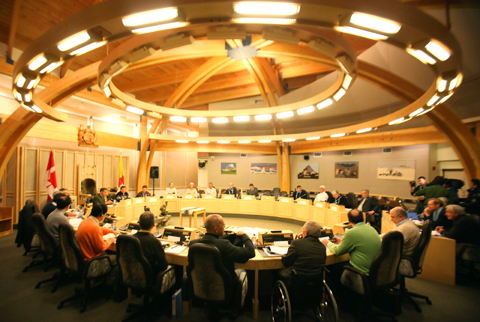Reassurances about debt-strapped Greece and an agreement that banks should pay for future rescue funds capped an international meeting in Canada’s Arctic as European policymakers sought to convince jittery markets that they have things under control.
Ministers and central bank governors said economies were recovering from recession, but stuck to their view that it was too early to withdraw government help.
In a statement issued on Saturday after two days of G7 talks, European Central Bank President Jean-Claude Trichet said he believed Greece would meet tough targets to lower its budget gap.

PHOTO: AP
“We expect and we are confident that the Greek government will [make] all the decisions that will permit it to reach that goal,” Trichet said.
French Finance Minister Christine Lagarde said euro zone countries would make sure the Greek plan was implemented and Jean-Claude Juncker, chairman of the group of euro zone finance ministers, dismissed the idea Greece would need money from the IMF.
World stock markets slumped to three-month lows on Friday on fears that Greece’s crisis would spread and the euro fell to its lowest level against the US dollar in eight-and-a-half months.
Earlier, officials from the G7 — comprising Britain, Canada, France, Germany, Italy, Japan and the US — said support was rising for a levy on banks that could pay for global governments’ rescue of the financial system, but such a levy would have to be designed so it did not derail a tentative economic recovery, they said.
US Treasury Secretary Timothy Geithner played down differences between countries on banking reform.
Last month the administration of US President Barack Obama stunned the banking industry with tough reform proposals that took other countries by surprise too.
“We all share a deep commitment to try to move forward and reach agreement on a strong, comprehensive set of financial reforms on the timetable we all committed to last September,” he said. “That means agreement on ... a new set of capital requirements for large global institutions by the end of this year.”
Iqaluit, the town that hosted the meeting, was the most exotic location for a G7 meeting to date, offering food that included Arctic char and muskox minestrone. A shortage of commercial flights and the distances involved meant most ministers used government jets.
Geithner said that the G7 underscored its commitment to reinforcing recovery, while Canada’s Jim Flaherty said the global economy was improving but still needed government help.
“We do not have a firmly established recovery yet, but there are signs,” he said.
The US and other big economies are also saddled with debts, having spent heavily to stave off a depression.
Ratings agency Moody’s Investors Service this week said the US must do more to keep its AAA rating after the Obama administration said it expected a deficit equivalent to 10.6 percent of GDP this year, more than three times the level considered sustainable by economists.

Nvidia Corp yesterday unveiled its new high-speed interconnect technology, NVLink Fusion, with Taiwanese application-specific IC (ASIC) designers Alchip Technologies Ltd (世芯) and MediaTek Inc (聯發科) among the first to adopt the technology to help build semi-custom artificial intelligence (AI) infrastructure for hyperscalers. Nvidia has opened its technology to outside users, as hyperscalers and cloud service providers are building their own cost-effective AI chips, or accelerators, used in AI servers by leveraging ASIC firms’ designing capabilities to reduce their dependence on Nvidia. Previously, NVLink technology was only available for Nvidia’s own AI platform. “NVLink Fusion opens Nvidia’s AI platform and rich ecosystem for

‘WORLD’S LOSS’: Taiwan’s exclusion robs the world of the benefits it could get from one of the foremost practitioners of disease prevention and public health, Minister Chiu said Taiwan should be allowed to join the World Health Assembly (WHA) as an irreplaceable contributor to global health and disease prevention efforts, Minister of Foreign Affairs Lin Chia-lung (林佳龍) said yesterday. He made the comment at a news conference in Taipei, hours before a Taiwanese delegation was to depart for Geneva, Switzerland, seeking to meet with foreign representatives for a bilateral meeting on the sidelines of the WHA, the WHO’s annual decisionmaking meeting, which would be held from Monday next week to May 27. As of yesterday, Taiwan had yet to receive an invitation. Taiwan has much to offer to the international community’s

CAUSE AND EFFECT: China’s policies prompted the US to increase its presence in the Indo-Pacific, and Beijing should consider if this outcome is in its best interests, Lai said China has been escalating its military and political pressure on Taiwan for many years, but should reflect on this strategy and think about what is really in its best interest, President William Lai (賴清德) said. Lai made the remark in a YouTube interview with Mindi World News that was broadcast on Saturday, ahead of the first anniversary of his presidential inauguration tomorrow. The US has clearly stated that China is its biggest challenge and threat, with US President Donald Trump and US Secretary of Defense Pete Hegseth repeatedly saying that the US should increase its forces in the Indo-Pacific region

ALL TOGETHER: Only by including Taiwan can the WHA fully exemplify its commitment to ‘One World for Health,’ the representative offices of eight nations in Taiwan said The representative offices in Taiwan of eight nations yesterday issued a joint statement reiterating their support for Taiwan’s meaningful engagement with the WHO and for Taipei’s participation as an observer at the World Health Assembly (WHA). The joint statement came as Taiwan has not received an invitation to this year’s WHA, which started yesterday and runs until Tuesday next week. This year’s meeting of the decisionmaking body of the WHO in Geneva, Switzerland, would be the ninth consecutive year Taiwan has been excluded. The eight offices, which reaffirmed their support for Taiwan, are the British Office Taipei, the Australian Office Taipei, the